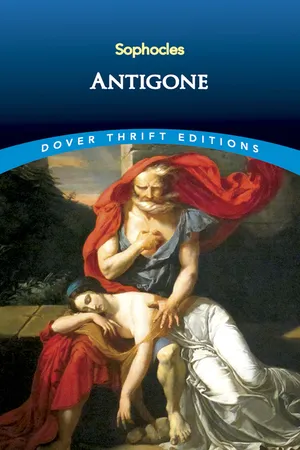Antigone
About this book
In his long life, Sophocles (born ca. 496 B.C., died after 413) wrote more than one hundred plays. Of these, seven complete tragedies remain, among them the famed Oedipus Rex and Oedipus at Colonus. In Antigone, he reveals the fate that befalls the children of Oedipus. With its passionate speeches and sensitive probing of moral and philosophical issues, this powerful drama enthralled its first Athenian audiences and won great honors for Sophocles.
The setting of the play is Thebes. Polynices, son of Oedipus, has led a rebellious army against his brother, Eteocles, ruler of Thebes. Both have died in single combat. When Creon, their uncle, assumes rule, he commands that the body of the rebel Polynices be left unburied and unmourned, and warns that anyone who tampers with his decree will be put to death.
Antigone, sister of Polynices, defies Creon's order and buries her brother, claiming that she honors first the laws of the gods. Enraged, Creon condemns her to be sealed in a cave and left to die. How the gods take their revenge on Creon provides the gripping denouement to this compelling tragedy, which remains today one of the most frequently performed of classical Greek dramas.
Tools to learn more effectively

Saving Books

Keyword Search

Annotating Text

Listen to it instead
Information
Antigone
ANTIGONE. Ismene, dear in very sisterhood,
Means to fulfil, before we come to die,
Out of all ills that grow from Œdipus—
What not, indeed ? for there’s no sorrow or harm,
No circumstance of scandal or of shame
I have not seen, among your griefs, and mine.
And now again, what is this word they say
Our Captain-general proclaimed but now
To the whole city ? Did you hear and heed ?
Or are you blind, while pains of enemies
Are passing on your friends ?
Pleasant or grievous, ever since we two
Of our two brothers were bereft, who died
Both in one day, each by the other’s hand.
And since the Argive host in this same night
Took itself hence, I have heard nothing else,
To make me happier, or more miserable.
Withheld it from the other ? Eteocles
Duly, they say, even as by law was due,
He hid beneath the earth, rendering him honour
Among the dead below ; but the dead body
Of Polynices, miserably slain,
They say it has been given out publicly
None may bewail, none bury, all must leave
Unwept, unsepulchred, a dainty prize
For fowl that watch, gloating upon their prey !
This is the matter he has had proclaimed—
Excellent Creon ! for your heed, they say,
And mine, I tell you—mine ! and he moves hither,
Meaning to announce it plainly in the ears
Of such as do not know it, and to declare
It is no matter of small moment ; he
Who does any of these things shall surely die ;
The citizens shall stone him in the streets.
So stands the case. Now you will quickly show
If you are worthy of your birth or no.
I shall not prove disloyal.
Abhorred—dishonoured—blind—his eyes put out
By his own hand ! How she who was at once
His wife and mother with a knotted noose
Laid violent hands on her own life ! And how
Our two unhappy brothers in one day
Each on his own head by the other’s hand
Wrought common ruin ! We now left alone—
Do but consider how most miserably
We too shall perish, if despite of law
We traverse the behest or power of kings.
We must remember we are women born,
Unapt to cope with men ; and, being ruled
By mightier than ourselves, we have to hear
These things—and worse. For my part, I will ask
Pardon of those beneath, for what perforce
I needs must do, but yield obedience
To them that walk in power ; to exceed
Is madness, and not wisdom.
Though you desire, shall you, with my good will,
Share what I do. Be what seems right to you ;
Him will I bury. Death, so met, were honour ;
And for that capital crime of piety,
Loving and loved, I will lie by his side.
Far longer is there need I satisfy
Those nether Powers, than powers on earth ; for there
For ever must I lie. You, if you will,
Hold up to scorn what is approved of Heaven !
Against the state.
Over my most dear brother.
Not publish it to all.
Incur the dead man’s hatred. Suffer me
And my unwisdom to endure the weight
Of what is threatened. I shall meet with nothing
More grievous, at the worst, than death, with honour.
I. 1.
Who came from Argos in armour dight
Hurrying runagate o’er the plain,3
Jerking harder his bridle rein ;
Who by Polynices’ quarrellous broil
Stirred up in arms to invade our soil
Table of contents
- Title Page
- Performance
- Bibliographical Note
- Copyright Page
- Table of Contents
- Note
- Persons Represented
- Antigone
- DOVER · THRIFT · EDITIONS
Frequently asked questions
- Essential is ideal for learners and professionals who enjoy exploring a wide range of subjects. Access the Essential Library with 800,000+ trusted titles and best-sellers across business, personal growth, and the humanities. Includes unlimited reading time and Standard Read Aloud voice.
- Complete: Perfect for advanced learners and researchers needing full, unrestricted access. Unlock 1.4M+ books across hundreds of subjects, including academic and specialized titles. The Complete Plan also includes advanced features like Premium Read Aloud and Research Assistant.
Please note we cannot support devices running on iOS 13 and Android 7 or earlier. Learn more about using the app
